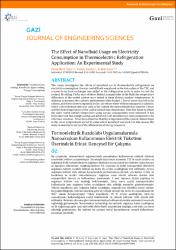The effect of nanofluid usage on electricity consumption in thermoelectric refrigeration application: an experimental study
Künye
Cüce P.M., Güçlü, T. & Cüce, E. (2022). The effect of nanofluid usage on electricity consumption in thermoelectric refrigeration application: an experimental study. Gazi Mühendislik Bilimleri Dergisi, 8(2), 228-236.Özet
This study investigates the effects of nanofluid use in thermoelectric refrigerators on
electricity consumption. A water-cooled block was placed on the hot surface of the TEC, and
a water-to-air heat exchanger was added to the refrigeration cycle in order to cool the
coolant. By adding 1% by mass of three distinct nanoparticles to the fluid, the temperature
differences of the cooled cabinet were tested at three distinct outdoor temperatures. In
addition, to measure the cabinet’s performance when loaded, 1 litre of water was left in the
cabinet, and the tests were repeated. In the case where water without nanoparticle addition,
which is the reference case, was used as the coolant, the measurement was made for 1 hour,
and the final temperature of the cooled cabinet was determined. Then the times to obtain
the same cooled cabinet temperature using various nanoparticles were observed. It has
been observed that energy savings are achieved in all nanofluid use cases compared to the
reference situation. It has been observed that the temperature of the cooled cabinet drops
to the lower temperatures earlier in cases where nanofluid was used. For this reason, this
study is essential in terms of the efficient use of energy resources. Bu çalışmada, termoelektrik soğutucularda nanoakışkan kullanımının elektrik tüketimi
üzerindeki etkileri araştırılmıştır. Bu amaçla tasarlanan sistemde TEC'in sıcak tarafına su
soğutmalı blok yerleştirilmiş ve soğutucu akışkanın ısısını almak için sisteme sudan havaya
ısı eşanjörü eklenmiştir. Akışkana kütlece %1 oranında üç farklı nanopartikül eklenerek
soğutucu kabinin sıcaklık farkları üç farklı dış ortam sıcaklığında test edilmiştir. Ayrıca
soğutucu kabinin dolu olması durumundaki performansını ölçmek için kabine 1 litre su
bırakılmış ve testler tekrarlanmıştır. Soğutma sıvısı olarak referans durum olan
nanopartikül ilavesiz su kullanılması durumunda 1 saat boyunca ölçüm yapılmış ve
soğutucu kabinin son sıcaklığı belirlenmiştir. Daha sonra çeşitli nanopartiküller
kullanılarak aynı soğutucu kabin sıcaklığının elde edildiği zamanlar gözlemlenmiştir.
Yüksüz koşullarda aynı soğutma kabini sıcaklığına ulaşmak için tüketilen enerji miktarı
karşılaştırıldığında, referans duruma göre en yüksek iyileştirme Al2O3-Su nanoakışkanı ile
%57 olarak hesaplanmıştır. Yüklü koşullarda, 18 °C ortam sıcaklığında Al2O3-Su
nanoakışkanı kullanıldığında enerji tüketiminde en yüksek iyileşme %50 olarak elde
edilmiştir. Referans duruma göre tüm nanoakışkan kullanım durumlarında enerji tasarrufu
sağlandığı gözlenmiştir. Nanoakışkan kullanıldığı durumlarda soğutucu kabin sıcaklığının
su ile soğutmaya göre aynı sürelerde daha düşük sıcaklıklara düştüğü, yani daha az enerji
tükettiği gözlenmiştir. Bu nedenle bu çalışma enerji kaynaklarının verimli kullanılması
açısından önemlidir


















